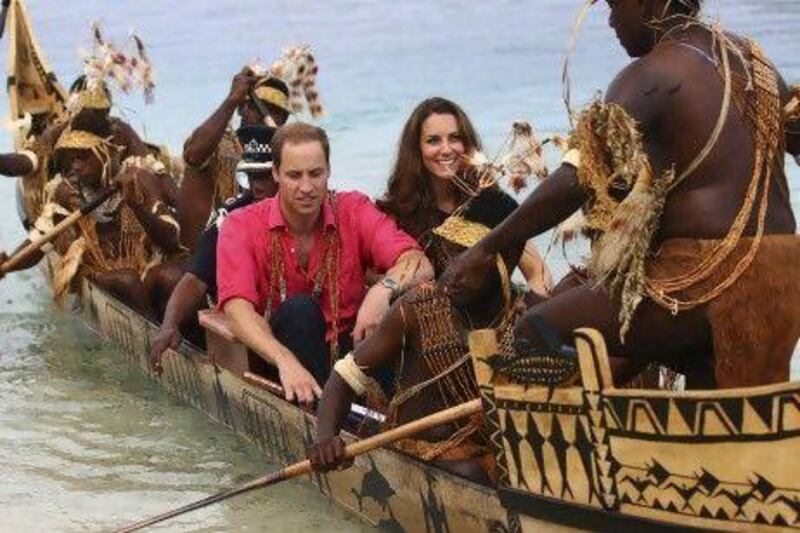LONDON // The British royal family launched an unprecedented legal battle in France yesterday in the row over the publication of intrusive photographs of Kate Middleton, the Duchess of Cambridge.
Aurelien Hamelle, a lawyer for Prince William and his wife, told a court hearing in the Paris suburb of Nanterre that the photographs of the duchess sunbathing topless on the balcony of a French chateau had no place in the public domain.
The photographs, published in French celebrity magazine Closer, were taken "in a highly intimate moment during a scene of married life and have no place on the cover of a magazine", Ms Hamelle told the court.
Drawing a parallel with the "fatal hunt" by paparazzi that led to the death of William's mother, Diana, the Princess of Wales, in 1997, Ms Hamelle urged the presiding judge to grant an injunction against all republishing of the photographs in print and in digital form and to ban their resale.
A French judge will rule this morning on the requests.
The royal couple's office confirmed they were seeking criminal proceedings, which carry the possibility of imprisonment.
Any such charge could be brought against the photographer or photographers responsible for taking the long-range pictures of the duchess on the terrace of a chateau in Provence, and the magazine's editor, Laurence Pieau.
They also want financial penalties and an order requiring any court condemnation to be displayed on the magazine's front cover. Damages will be sought in a later hearing.
The pictures were taken using one or more powerful lens from a location more than a kilometre from Château d'Autet, near Aix-en-Provence, a retreat owned by Viscount Linley, a nephew of the British monarch, Queen Elizabeth II.
The couple took a short holiday there earlier this month.
What began as another dispute between British royalty and the media has quickly escalated into a battle of wills involving the family of Italy's former prime minister, Silvio Berlusconi.
Mr Berlusconi owns the Mondadori publishing group that produces both Closer and Chi, an Italian gossip magazine that defied criticism yesterday and went ahead with plans to produce a 26-page supplement devoted to the duke and duchess's holiday.
The controversy also threatens to lead to the punitive closure of an Irish tabloid newspaper, the Daily Star, after its British co-owner condemned its decision to publish some of the offending photographs.
The paper's British stablemate, which bears the same title, had refrained to publish the material in common with all other sections of the mainstream British media.
As well as identifying high moral ground and attacking the decisions of others to print the photographs, British newspapers have reported the affair in tones overwhelmingly sympathetic to the royal couple, who have been on a tour of South East Asia and the Pacific throughout the furore.
The censorious attitude of the London-based press reflects, in part, a newly developed sensitivity to criticism of past excesses. The industry finds itself under attack from not only commercial pressures but hostile public, political and judicial reaction to its practices.
One irony of the storm created by the publication of the photographs is that the lead was taken by a magazine in France, which prides itself on some of the West's strictest legal restraints to protect individual privacy.
But without the law having been relaxed, the French media have become gradually bolder since the presidency of Francois Mitterand. For more than a decade, the country's press observed total silence on the president's "parallel family", a mistress and their daughter. He was later revealed to have used the apparatus of state, including French security services, to ensure his domestic arrangements and his declining health - both open secrets in political and media circles - remained undisclosed.
As the French press has chipped away at old taboos, it has become commonplace for some elements to risk fines of up to €45,000 (Dh216,000) as the price of increased sales.
Imprisonment is theoretically possible, but is considered unlikely in practice unless serious aggravating features are proved.
One British photographer with experience of working in France said he knew international paparazzi who would cheerfully pay heavy financial penalties after earning much more from publications willing to accept their work.
It has not been lost on British media observers that condemnation of Closer and Chi has come from some of the same newspapers that recently fought for and eventually won the right to print photographs of the duke's younger brother, Harry, cavorting naked with friends at a private party in Las Vegas.
Britain's top-selling tabloid, The Sun, rejected charges of hypocrisy
In editorial comment at the weekend, it said: "The Sun made no moral judgement about Harry's behaviour. Last night he was bravely serving his country in Afghanistan, where his Camp Bastion base was under fire.
"But we maintained that, as third in line to the throne, it was a legitimate matter of public interest ... The pictures of Kate fall into an entirely different category.
"She was on a private holiday in a private chateau. The path from which the photographer took his pictures was a mile away. She had every expectation of privacy.







